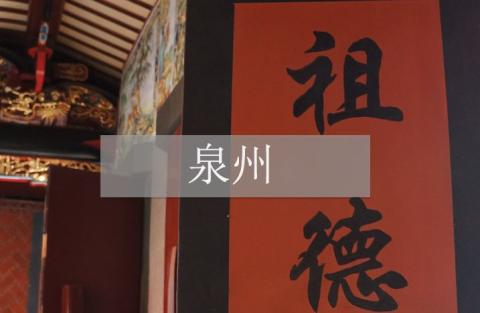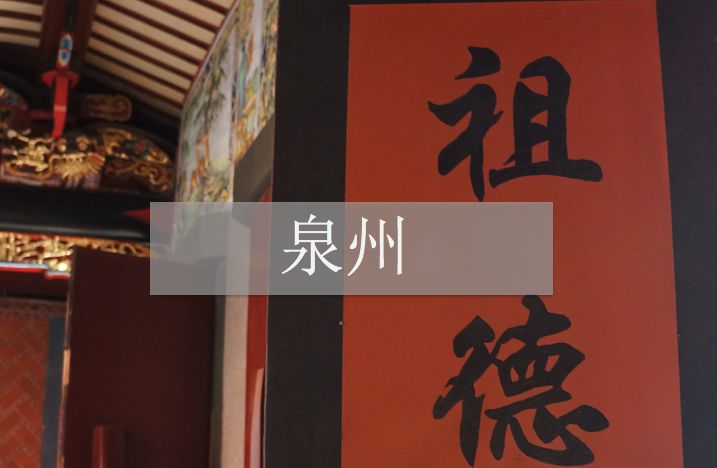

He said that the issue of overseas Chinese can be discussed from the perspective of four generations.
Coming out of Quanzhou Railway Station, I saw Uncle Lin. This is also the first time I met Uncle Lin. When I went to Wuyishan in 2013, he had just resigned as the general manager of Wuyishan Villa and returned to Quanzhou to start his own business. Master's brothers and sisters are all over China. They knew that I was coming to Quanzhou to do some interviews about "Chinese immigration." Master asked me to find Uncle Lin, saying that he could help me talk about this topic and see some related things.
In Uncle Lin's office, I saw his wife and my senior sister. Although she was about fifty years old, she still maintained a neat and meticulous face, a little girl's figure, and a vitality that gradually jumped out during the conversation. While drinking Dahongpao, without any greetings like the first meeting, Uncle Lin got straight to the point and started the topic we wanted to talk about.
He said that the issue of overseas Chinese can be discussed from the perspective of four generations.

Like his grandfather's generation, they came out before liberation and during the war. Most people from Fujian go to Southeast Asia. His grandfather had been to the Philippines, and many of his relatives also went to the Philippines, all leaving from Quanzhou Port. Now, Quanzhou Port is the only “starting point of the Maritime Silk Road” recognized by the United Nations. Quanzhou Port was formerly known as "Citong Port" and had communication with overseas countries during the Tang and Song Dynasties. Perhaps because of this geographical location and historical origin, it is not unfamiliar to Quanzhou people to make a living abroad.
"My grandfather went out with relatives when he was a teenager. At first, he worked as a storekeeper, and later learned to do bookkeeping. My grandma's family basically all went out, and they were all in the Philippines. One of my grandma's cousins, The business in the Philippines is very big. One of her cousins is also doing well and has established the Overseas Chinese Chamber of Commerce in Manila. Now, their descendants have spread all over the world, including businessmen, doctors, and businessmen. Lawyers from all walks of life. They now send their children and grandchildren back to Quanzhou every year to participate in clan gatherings. In fact, most people of my grandfather’s generation come back when they are in their twenties. , married my grandma, and went out after giving birth to my father. My grandfather worked for others all his life. Later, when he was in his sixties, he became ill and returned to his hometown. "

"Myfather's generation is the second generation of overseas Chinese. What happened to them when they left? It's because their parents developed better abroad and took their children out one by one. Compared with Quanzhou Famous people, such as Lin Xiuze (xiuze) and Li Zhanwang (zhanwang), during the Cultural Revolution and when the country was relatively turbulent, their parents were better (even if they were not successful). ), who took them out. People of their generation are now in their eighties or nineties.”
"Next is our generation . This generation is different from the previous two generations. The first generation went to Southeast Asia to make a living, the second generation was the 'take-out' generation, and our third generation belongs to the recovery group. The first batch of people after the college entrance examination went to study abroad or work in European and American countries at their own expense. Many of my classmates and relatives, including myself, also had this idea at the time, but he was not studying at the time. I went to work in Australia. Many of my classmates from Peiyuan Middle School are now working in real estate, furniture trade, and restaurants. They have settled in Australia, the United States, Japan, and Europe. Many of them can also be called 'new immigrants'. They have developed well overseas and have caught up with China's rapid development and invested domestically. "
"At that time, instead of studying abroad, there were many ways to go out, such as going to Hong Kong first, and then moving to other parts of the world. Generally, if you had relatives in Hong Kong, you could take them out one by one. But at that time, one of the brothers and sisters usually had to stay in China. Because someone has to collect the foreign currency sent back, and someone has to take care of the family affairs. The house my parents lived in was bought by relatives who sent 100,000 US dollars from abroad. At that time, one US dollar could be exchanged for ten yuan. I remember that my grandparents said that during difficult times, relatives sent rice and oil back from abroad.”

"The next generation is our children's generation, the generation now in their twenties and thirties. After the college entrance examination, they will go abroad, or they will be sent abroad to study at their own expense."
Regarding this generation, Uncle Lin and Sister Lin were parents and talked for a while about the differences in education at home and abroad.
Uncle Lin said: "There are many examples around us. People who studied poorly at home did very well abroad. She had a classmate's son who couldn't pass the college entrance examination..."
The senior sister took over: "He only scored 300 points in the exam. The score line for college entrance examination that year was more than 500 points. Later, he was allowed to study at New Oriental, and was admitted to the University of Melbourne. Now he is working in Melbourne. I also have a friend's My daughter also failed the exam. They stayed with my daughter for one year. My friend was the director of the admissions office at the International College of Xiamen University, and she was mainly responsible for studying abroad. Then she sent her daughter to a preparatory class at the school. I majored in English and went to the United States. In the United States, my scores in the first year of the unified examination were all A. After finishing college, I went on to graduate school. Compared with many college students in China, after graduation. It’s very difficult to find a job. If there is no way to go abroad, these children will be useless.”
Uncle Lin continued: "There is another child who is my colleague's son. He is a boy and he is playful. He scored more than 200 points in the college entrance examination. My colleague sent his son to Malaysia to study in a language school. After one year, he went to the UK to study at university. , studied accounting and actuarial science. He obtained the "actuary" qualification certificate and was recommended by his teacher to a company in Singapore that specializes in preparatory work for many quasi-listed companies around the world. I am twenty-seven or eight years old, very confident, and very comfortable. But when I was in Quanzhou, I was scolded by the teacher all day long, and I lost my confidence. I also have a friend's child who is also twenty. How old is he? He went to England to study for two years and got two degrees. He came back from summer vacation and changed a lot. He used to not help his grandma when he went out, but now he saw an old man walking on the road. On the road, we will take the initiative to help. We have always said, 'respect the old and love the young', but we have not educated him for so long, but others have educated him in one year."
Most new immigrants study abroad and integrate into mainstream overseas society.
"There is still a type of immigrant who is of the same generation as the third generation, and is now in their 50s and 60s. They made their first pot of gold at home, grew bigger, and moved their property overseas. They continue to Doing business in China, but their identities are foreign. For example, many businessmen in southern Fujian have foreign identities, or they are from Hong Kong and Macao. It is very easy to immigrate to Hong Kong and Macao by buying a house. A house in Macau only costs more than 10,000 Australian dollars per square meter... I have a friend who is engaged in real estate here. When he came to Australia, he was still engaged in real estate. There was a lot of land there and it was very cheap. He bought a large piece of land and built it. One by one, the houses are sold exclusively to Quanzhou people who live there. If you call someone at night, they will come, play cards, and drink, and they will all speak Hokkien. It's the same over there. Some of the streets are all spoken in southern Fujian. So, after going out, many of my friends feel that the air is good, the education is good, the medical care is good, things are cheap, the food is safe, and a group of friends are there. No problem socializing.”
"But there are also some who don't want to go out. For example, my two sisters and one brother. At that time, my relatives came from Hong Kong and told my father, I will take one of your children out and let him study there. . But none of our four siblings want to go out, including my daughter. Sometimes, we also have some ideas, and the society is not very stable. Some practices have the central government’s ideas. We in business also have our own ideas... We feel that there are many shortcomings in the country. We had a special time to talk to my daughter about this matter the year before last. The country is not very stable. The economy looks prosperous on the surface, but for the people. It’s not very good, and the surrounding political environment is not very favorable to China. Whether there will be a war is still a question. We want to send you out and see how it goes..."
"But this is what my daughter said. She said: 'I can't choose the country or my parents. Which country I was born in or which family I was born into is not something I can choose. It's natural. My parents, If you are a gambler or poor, I will work hard to make money to support them. If you owe money to others, dad, I will also make money to help you pay it back. Although the country has many problems, these problems depend on our young generation. People change step by step, bit by bit. I can't just criticize the country if it's not good, and leave it. So I want to stay in China and work with the people around me to make it better. . '"
"Actually, I think what she said represents many people of this generation. She said not to always criticize this country on Weibo and WeChat. This country is not good and that is not good. Not all of the younger generation want to leave the motherland. There are also many people who are socially responsible.”

